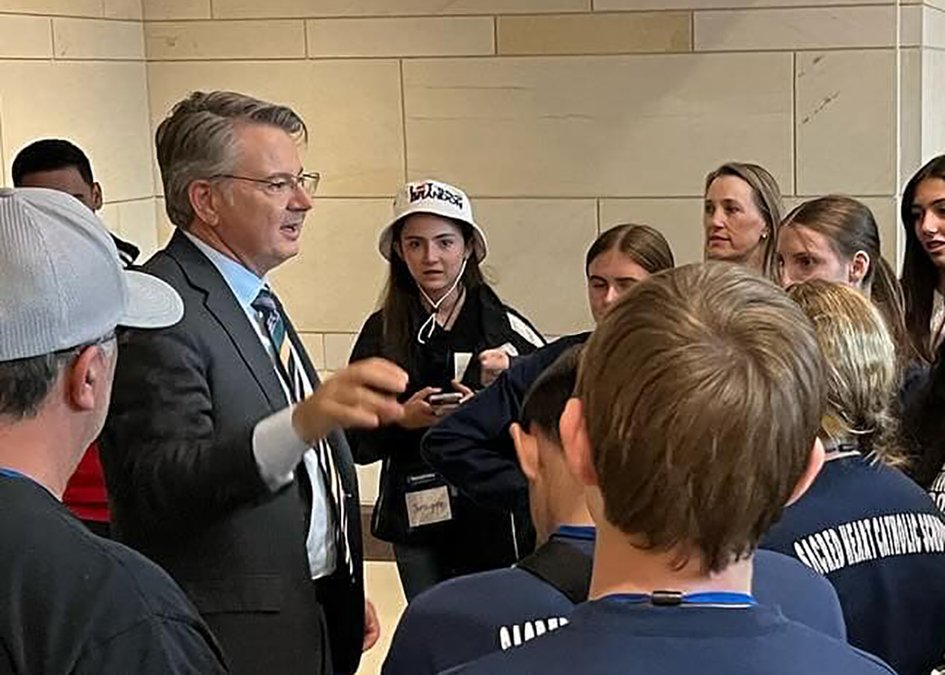Congress has been gridlocked for nearly three weeks, and the Republican House majority is no closer to selecting a Speaker than it was after ousting Rep. Kevin McCarthy (R-Bakersfield) from the post Oct. 3.
Rep. Jim Jordan (R-Ohio) pulled his name out of the running Friday after failing to gain the gavel on the third ballot — with dwindling support on each successive vote.
Turlock’s two members of Congress — Rep. John Duarte (R-Hughson) and Rep. Tom McClintock (R-El Dorado Hills) — continued to throw their weight behind Jordan, siding with the House Judiciary chairman all three times.
But supporting a conservative firebrand such as Jordan — a member of the far-right Freedom Caucus who has called for the impeachment of President Biden while continuing to deny the outcome of the 2020 presidential election — would seem to be more problematic for Duarte than McClintock.
“Duarte absolutely has to thread the needle here,” said Stephen Routh, associated dean of Arts, Humanities and Social Sciences, and a professor of political science at Stanislaus State University. “He can’t get too far out over his skis … he has to keep his constituents happy.”
Duarte earned the right to represent the redrawn 13th Congressional District last November, beating former Assembly member Adam Gray (D-Merced) by just 564 votes in a race that saw more than 133,000 votes cast. Had the 13th existed in its current form during the 2020 general election, it would have gone for President Biden by a 54-43 margin, according to ballotpedia.com.
Duarte is one of handful of House Republicans who represent districts that Biden carried three years ago, and Gray already has filed to challenge Duarte in 2024. The Cook Political Report lists the race as a toss-up.
“He’s a great experiment to watch,” said Routh. “He’s a freshman, a loyal member of the party, up for re-election for the first time, and he barely won his first election. It’s amazing how close that race was.”
McClintock meanwhile represents the 5th Congressional District that covers much of the rural areas along the Sierra Nevada between Sacramento and Fresno. The 5th is listed by CPR as solidly Republican, and had the district existed in its current form in 2020, it would’ve gone for Donald Trump by 12 points, according to ballotpedia.com.
“I was looking at district lines and they are heavily rural,” said Routh. “So, Duarte has a little room to play with. But, again, he has to thread the needle. He has to have his antennae up.”
According to Routh, routine party-line votes typically don’t draw much interest from the public. But ever since Rep. Matt Gaetz (R-Florida) called for a motion to vacate, resulting in the removal of a sitting Speaker for the first time in history, the nation is in uncharted political territory.
“This is why you don’t want to see sausage or politics being made,” said Routh. “These are not good optics for the Republican party. If the Israel-Gaza situation had not happened, this would be a 24/7 embarrassment for the Republicans. And that may not help Duarte.”
The silver lining for the first-term legislator is that the general election is a year away, and the attention span of the American electorate tends to be short.
“Constituents back home, particularly in the Central Valley, tend to be focused on ‘What are you doing for us?’” said Routh. “They tend to focus on water, ag, and economic issues such as jobs, housing costs … so I have a feeling this doesn’t have legs. It’s getting a ton of press now, but two weeks from now, who knows? You’ve got Israel-Gaza, the Trump trials, Hunter Biden … the shelf life for this type of thing is brief. But Gray will continue to bring it up.”
Regarding a Speaker, the Republicans have few cards left to play. Aside from temporarily granting more power to Speaker pro tempore Patrick McHenry (R-N.C.), they could coalesce around a moderate Republican who’s acceptable to all members of the conference. Or, moderates could reach across the aisle to work with the Democrats in selecting a suitable replacement.
“Thirty or 40 years ago I’d say maybe,” said Routh. “But it’s so polarized, if Republicans did that, they’d be metaphorically tarred and feathered. The moderates in Congress today are not the moderate, liberal Republicans of the 1970s.
“From a political-science perspective, we’ve never seen this play out so overtly in public before. If it was behind closed doors, they could work out a deal. But all this stuff — social media, 24/7 news — makes it hard. Sunlight is good for democracy in general, but sometimes you have to darken the room and work out a deal.”





